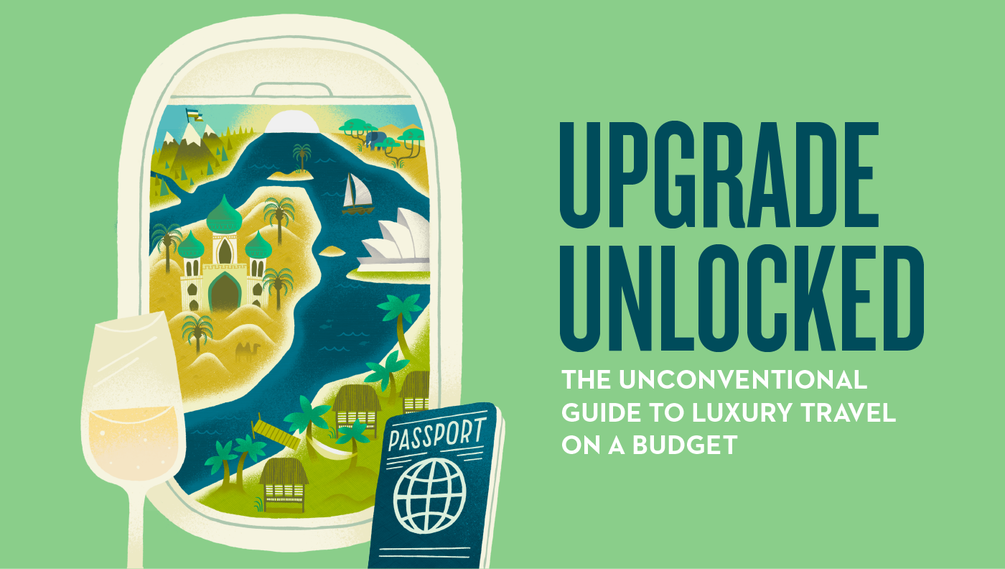How I afford travel: Badass trips on a not-so-badass budget
Many travel blogs are written by people who’ve sold all their possessions and have taken a huge plunge into the world of long-term travel. This can sound expensive at first, but when you consider that you don’t have rent or a car payment in this lifestyle (or much room to carry any possessions), it can actually be very cheap to live this way, provided you can work a little along the way, or do some kind of virtual freelancing or contract work.
I’m not one of those people.
I do have rent to pay, and a car payment, and bills, and the trappings of a fairly typical middle class young urban professional life. I have a cat. I worked in a cubicle, up until a few months ago. I'm introverted, and enjoy spending time at home. I like my routines, and sleeping in my own bed.
I also don’t have a ton of free income to spend on travel.
Despite all this, in the past 6 years I've managed to see 40 cities in 17 countries. Not much for the permanent nomad, but a lot for someone who all that while was expected to be at work by 8:30 or 9am every weekday.
When people find out how much I travel, some imagine I must have a lot of spare income or be a trust fund baby. I keep encountering this perception – especially among Americans – that travel is this huge undertaking that is incredibly expensive. Well, it sure can be, if you choose to make it that way. But if you step outside this perception, and do some research, you’ll find that it really doesn’t have to be that way. Travel can be affordable, if you plan for it and prioritize it in your life.
Here’s how I do it:
1. I RARELY PAY CASH FOR FLIGHTS.
By far, flights can be the single most expensive purchase of your trip. A coach round trip ticket from the US to Europe usually runs anywhere from $800-1200 on average, depending on the season. The trick is: don’t buy your ticket with actual money. Buy it with fake money called points or miles.
A few years ago, I strategically opened 2 different credit cards (one an AmEx, one a British Airways Visa) with unusually crazy high enrollment bonuses. Within just a few months’ time I went from 0 miles to 50,000 AmEx points (redeemable for airline miles on at least a 1:1 basis) and 100,000 British Airways miles. Keep in mind, BA is part of the OneWorld alliance, so I can book with other airlines using these miles. In just a few months’ time, with 2 credit cards (that didn’t hurt my credit, by the way) I earned enough miles to take 3 international round trip flights – without ever stepping on an airplane. I got the AmEx points simply for opening the card, and I earned the BA miles after spending $2500 in 3 months, which wasn’t that hard for me because I strategically put ALL my expenses on the card for 3 months.
The trick is knowing which cards to open. These cards usually aren’t well advertised, so you’ll have to do your research. A few good resources to get you started:
👉 UPGRADE UNLOCKED by Chris Guillebeau. This is actually the first resource I used to learn more about travel hacking. If you’re a total newbie, as I was, this is the best introduction to the world of frequent flyer miles that exists. But it’s not overly simplistic; there are a ton of insider tricks and tools in here that I haven’t even taken advantage of yet. This guide is the reason I earned 150,000 miles without stepping foot on an airplane. It used to be called something else, and now the guide has a few different tiered options. If you're just starting out, the cheapest, "Pre-Boarding," will get you well on your way for $39.
Side note! I've been keeping this post updated since I first wrote it in 2012. When I first wrote this, I linked to Chris Guillebeau's guide simply because I wholeheartedly recommend it. Later on, I became an affiliate partner - hey, why not, if I was recommending it anyway? So now that means that if you buy his guide, I'll get a cut of that sale, but it's no extra cost to you. Thank you for supporting my little passion project travel blog!
THE POINTS GUY. This website used to share tips and tricks for travel hackers, but now it seems to mostly just recommend credit cards. His ads follow me around everywhere now, so be warned. However, when I want to find out what the latest credit card offers with crazy high enrollment bonuses, I go there first. So it's always worth a look and it's where I point people who ask me, "What's the best card to get?"
FLYERTALK.COM This is a forum for the serious hardcore travel hackers – the credit card “churners” who sometimes earn up to 1 million miles a year doing this. FlyerTalk can be intimidating at first if you’re new to all this, so I’d recommend starting from the top and working your way down.
2. THINK OUTSIDE THE BOX WHEN IT COMES TO HOTELS.
Rarely do I stay in what most Americans think of as a traditional hotel when I travel abroad. Many travel hackers and frequent business travelers are loyal to a certain brand of hotel, especially those with their own reward points systems, which earn them free stays (and yes, there are credit cards for this too). These can be a great value and I do participate in a few programs like Hilton HHonors for stateside bookings.
For my international trips, however, I prefer everyday price flexibility, so I book a variety of inexpensive, off the beaten path accommodation types – and none of them involve splitting a room with strangers, camping (not counting the bedouin camp I stayed with in Petra, which I did for the experience and not the savings), or couchsurfing. A lot of people associate budget travel with roughing it, but it is possible to be comfortable. In fact, by avoiding the beaten path, I usually have a less expensive, equally as comfortable, and more interesting cultural experience.
Most of my international trips have involved staying at a combination of private rooms at hostels, small or independently owned hotels, bed & breakfasts, and private apartments.
Hostelworld.com This room search and booking site will expand your idea of what a hostel can be. Often you’ll find that smaller, inexpensive and independent hotels will list rooms on Hostelworld even if they have a website and brand themselves as a hotel or bed & breakfast. You can search for rooms nearly anywhere in the world, filter by room type (most hostels have private bedrooms, some with private bathrooms and some with shared bathrooms), location (there’s a handy map view), price and more. It’s also low risk - you just pay a small 10% down payment when you book and the rest when you check in. I’ve stayed in some very nice hostels for a fraction of the cost of an equal quality hotel and it’s one of the first places I look when I start planning a trip.
Booking.com This is a rising star in the online travel booking world for hotels. Based in Amsterdam, they are one of my top sources for rooms in Europe (though they offer rooms in several other parts of the world too). Booking.com’s strength is their breadth of rooms available; you can find a variety of low-cost, tiny, independently owned hotels that will be difficult or impossible to find elsewhere. They even offer free cancellation on many rooms. Their pricing also cannot be beat – sometimes I even find rooms that are less expensive than hostels!
Airbnb.com A major disruptor to the online travel booking industry, Airbnb offers you the ability to reserve a room in a private apartment directly through someone who lives and is local to the place you’re going. You can book entire apartments or just spare bedrooms, allowing you the choice between having a cozy place all to yourself or staying with – and getting to know– a local, something that may not have happened otherwise (and my most memorable trips have been those in which I connected with locals while I was there). A few other perks can involve more amenities than a budget hostel or hotel may offer, such as the ability to wash your own laundry or cook your own food if you need to (it is an apartment, after all). I travel for 2 weeks at a time when possible (more on that later), and I pack only a carry-on. After a week like that, a washing machine is an unexpectedly welcome blessing. You’re often more likely to feel like a local, even if you never meet your host. You’re staying in a residential neighborhood, not a commercial, touristy zone. There’s a lot to be said for that.
3. I'M VERY STRATEGIC ABOUT Timing and trip length.
I would be remiss to say that the above 2 factors are the only methods I use to travel to so many places affordably.
The fact is, I can say I fit in 40 cities and 17 countries in 6 years because of how many of those cities and countries I manage to pack into a single trip. In most of my 17 day trips, I squeeze in about 3, sometimes 4 countries, hitting multiple cities in each. That means I typically pack up and move on every 2-3 days. That’s not a lot of time in each place! Just enough to visit the major sites, take in the atmosphere, and decide if I’m intrigued enough to return someday to make a longer trip of it.
This pace is not for everyone, but it works for me. I’m restless, and like squeezing every drop out of my precious vacation days. Plus, nothing’s worse than booking 5 days in a place you’ve never been, only to arrive and find out you’re bored after 1 day and it’s too late to make any changes. I intend to see the world, and I have to do it in 2 weeks per year. So, I compromise.
It can be a little tiring, but I don’t take these trips necessarily to relax – I take them to recharge in other ways. Travel is my passion and I crave new cultural experiences. My worldview has expanded a little more each time I set foot on US soil again; this is creative fuel to the fire of everything I do, from painting to writing to marketing strategy. That’s why I’m determined to prioritize it, even with a limited budget.
For those who’ve also been bitten by the travel bug, you get it. The rest of the world will go on thinking that we’re rich, and I suppose that’s fine.
Like this? Pin it!


